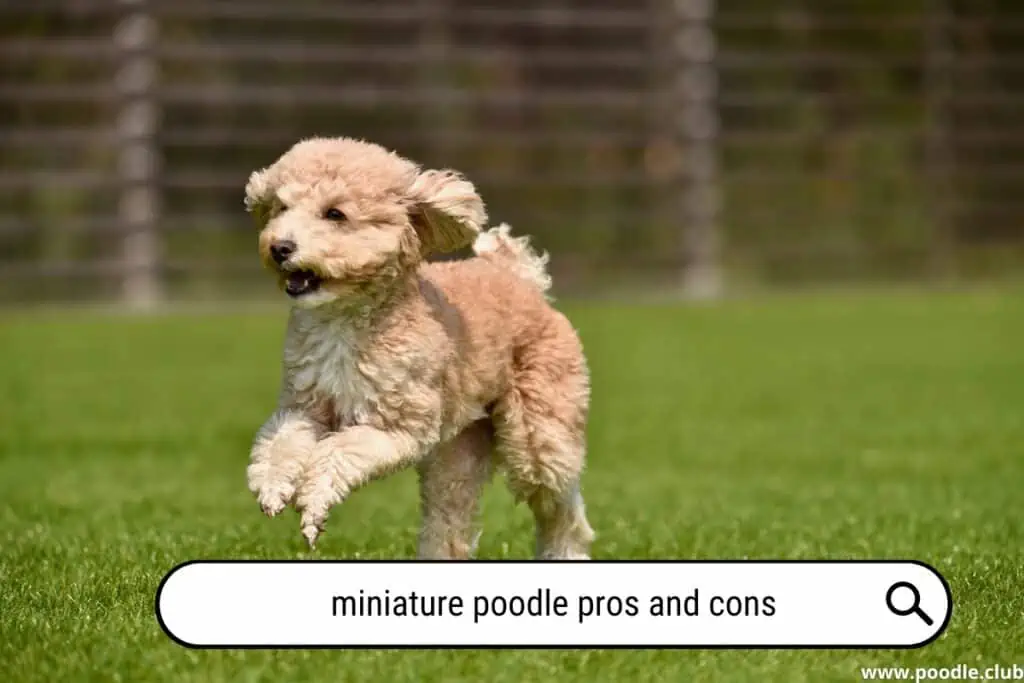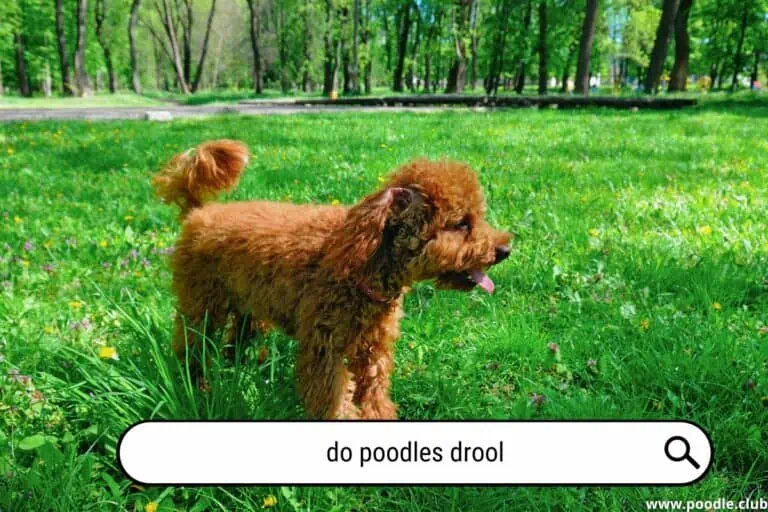Miniature Poodle Pros and Cons
Miniature Poodles, with their high intelligence and friendly nature, are a favorite among dog enthusiasts. However, like every breed, they come with both advantages and disadvantages that should be considered. Knowing these can help create a more fulfilling and harmonious pet-owner relationship.

Some of the great things about Miniature Poodles include their high trainability and minimal shedding, a relief for those with allergies or those who prefer less cleaning. However, their sophisticated look does not come without effort – these dogs require regular grooming to keep their coat healthy and tangle-free. Also, these little furballs love being around their humans and may experience separation anxiety if left alone too long.
Miniature Poodles are known for their longer lifespan, providing more years of companionship. But, they are prone to certain health conditions, like progressive rod-cone degeneration, which may require additional care and attention. In the end, deciding to bring a Miniature Poodle into your life is a decision that comes with both joy and responsibility, like with any pet.
Pros and Cons of Miniature Poodles
Of course, it’s not all challenges with Miniature Poodles. They also come with many wonderful qualities that make them great pets. Here are some pros of owning a Standard Poodle:
- Intelligence: Miniature Poodles are highly intelligent, ranking among the smartest dog breeds. This makes them easy to train and excellent at learning new commands and tricks.
- Non-Shedding Coat: Their tight curls don’t shed much, making Poodles a good choice for people with allergies or those who prefer a cleaner home environment.
- Versatile: These dogs excel in a variety of dog sports, including obedience, agility, and hunting tests. They’re always up for a new challenge!
- Friendly and Sociable: Poodles are known for their friendly and sociable nature. They generally get along well with children, other dogs, and other pets.
- Healthy Life Span: Despite certain breed-specific health issues, Poodles are known to live longer than many large breed dogs, with a life expectancy of 10-18 years.
- Adaptable: Miniature Poodles can adapt well to different living conditions. They can live happily in a city apartment or a house with a big yard as long as they get enough exercise.
These advantages make the Miniature Poodle a popular choice among dog lovers. As with any breed, it’s important to ensure that their needs align with your lifestyle, but for many, the rewards of owning a Poodle far outweigh the challenges.
Advantages
One of the main advantages of Miniature Poodles is their hypoallergenic coat. Due to their low shedding, they are ideal for people with allergies. Moreover, their elegant curls make their appearance unique and attractive, setting them apart from other breeds.
Another perk of Miniature Poodles is their energetic and playful nature. If you’re looking for a dog that will keep you on your toes, look no further! These pups love to run, chase toys, and participate in various activities, making them excellent companions for active people.
PuppySpot is a reputable dog marketplace where you can browse and find compatible puppies right from the comfort of your home. They have placed over 200,000 puppies into homes in the US!
Disadvantages of Mini Poodles
Mini Poodles are a wonderful breed, but like all dogs, they do have some drawbacks. Here are some cons that potential owners should consider:
- High Maintenance Grooming: Poodles have a dense, curly coat that requires regular grooming. They need frequent brushing to prevent matting and professional grooming every 4-6 weeks to keep their hair in check.
- Energy Levels: Poodles are energetic dogs that require regular exercise to stay happy and healthy. Without adequate physical activity and mental stimulation, they can become bored and may resort to destructive behaviors.
- Health Concerns: Poodles are generally healthy, but they’re prone to certain genetic health issues such as hip dysplasia, epilepsy, and certain types of eye disorders.
- Potential for Anxiety: Poodles can be prone to separation anxiety and may become stressed when left alone for long periods. This can lead to behavioral problems if not managed properly.
- Cost: The costs of owning a Poodle can add up, between professional grooming, high-quality food, and potential health care costs due to their breed-specific issues.
Remember, every dog is unique, and these potential drawbacks don’t mean that a Mini Poodle won’t be the perfect fit for your home. It’s just important to understand the responsibilities associated with this breed before bringing one into your home.
Expanding on the Negatives
Now, let’s talk about the disadvantages of Miniature Poodles. While their hypoallergenic coat is a blessing for people with allergies, it also requires regular grooming to keep it in good shape. If you don’t mind putting in some extra time and effort, then this won’t be an issue. But, if you’re a busy bee, maintaining their coat might become a hairy situation.
Additionally, their energetic behavior can be a double-edged sword. Miniature Poodles are highly intelligent and might develop some undesirable habits if not provided with proper stimulation and training. It’s essential to channel their energy into productive activities and establish consistent routines in order to keep them mentally and physically entertained.
In summary, Miniature Poodles have their fair share of pros and cons, like any other breed. Their hypoallergenic, low-shedding coat and playful nature make them great pets for the right person, but their grooming needs and high energy levels may not suit everyone. With proper care and attention, though, these little curly companions can brighten your life and keep you active, agile, and wagging your tail.
Care and Training
Miniature Poodles are often described as intelligent, energetic, and loving pets. In this section, we’ll cover the essential aspects of care and training for these delightful dogs, including feeding, exercise requirements, and training tips.
Feeding
When it comes to feeding your Miniature Poodle, a balanced and high-quality diet is essential. Some puppy owners prefer to start with a puppy-formulated kibble to support healthy growth and development. As your Poodle matures, it’s essential to adjust their caloric intake according to their age, activity level, and overall health.
Here’s a general guideline for feeding:
- Puppies: 3-4 meals a day
- Adults: 2 meals a day
- Seniors: 1-2 meals a day (depending on their activity level)
Make sure to provide fresh water at all times and monitor your dog’s weight to avoid obesity.
Exercise Requirements
Miniature Poodles are active dogs that need regular exercise to keep them mentally and physically fit. Aim for at least 30 minutes to 1 hour of daily exercise that includes walks, playtime, fetch, and even some doggy sports like agility training. In addition to physical exercise, socialization is also important for their emotional well-being. Regularly expose them to different environments, people, and other dogs to help build their confidence and ensure they’re well-adjusted.
Training Tips
Miniature Poodles are known for their excellent trainability, making them suitable for various roles, such as therapy dogs. When it comes to training, use positive reinforcement techniques to engage them. Some proven tips for training your Poodle include:
- Start with basic commands like “sit,” “stay,” and “come.”
- Reward good behavior with treats, praise, or playtime.
- Be consistent and patient; progress may take time.
- Enroll in puppy obedience classes for guidance and support.
Remember, while Miniature Poodles are generally receptive to training, they also have a playful and sometimes mischievous side. So don’t be surprised if you find them attempting to outsmart you once in a while. By providing a loving and structured environment, your Miniature Poodle will thrive and become a well-mannered companion.
Adoption and Buying
When considering adding a miniature poodle to your family, you have two primary options: buying from a reputable breeder or adopting from an animal shelter or rescue group. Each option has its advantages and disadvantages, so it is essential to weigh them carefully.
Finding a Reputable Breeder
If you decide to purchase a miniature poodle puppy, finding a reputable breeder is crucial. A good breeder will prioritize the health and temperament of their dogs, ensuring you get a happy and well-adjusted pup. Look for breeders that provide a clean and loving environment for their dogs, have proper licensing, and are transparent about the puppy’s lineage and health records. While the price of a miniature poodle from a breeder might be higher, you can be more confident about their background and upbringing.
However, not everything is sunshine and rainbows when buying from a breeder. Make sure to do thorough research, as not all breeders hold high ethical standards, and you might stumble upon a puppy mill (gasp), which should be avoided at all costs.
Adoption Options
On the other hand, adopting a miniature poodle from an animal shelter or a rescue group can be a heartwarming experience. Not only are you giving a lovely dog a second chance at a happy life, but adoption fees are often more affordable than breeder prices.
Shelters and rescue groups often have adult dogs with established temperaments, making them an excellent option for those who prefer to skip the rambunctious puppy stage. You can also benefit from the wisdom and assistance of the shelter or rescue group staff, who can help match you with a dog that fits your lifestyle.
Moreover, choosing to adopt could make you feel like a superhero, swooping in to save the day for your new best friend. After all, who doesn’t want to be the hero of their poodle’s story?
Keep in mind that adopted poodles may have unknown pasts, which might lead to some quirks and possible health issues down the line. But with love, patience, and maybe a few books on raising and training dogs, you’ll be well on your way to a beautifully integrated family.
As American canine expert, Michele Welton, once said, “I’d love to save every neglected poodle that comes through my door.” Now, as you embark on your miniature poodle journey, remember that whether you’re opening your heart and home to a rescue or buying from a reputable breeder, the love for your red (or any color) dog is the most vital ingredient.
Overview of Miniature Poodle
Miniature Poodles are a beautiful small to medium-sized breed of dog that has gained popularity for its friendly temperament, intelligence, and hypoallergenic coat. Let’s dive into the details of this charming breed.
Size and Appearance
Miniature Poodles typically stand at about 11 to 15 inches in height and weigh between 12 to 20 pounds. With their athletic build and proportions, they’re the perfect middle ground between the larger Standard Poodle and the smaller Toy Poodle. These curly-haired cuties are known for their expressive eyes and an almost-human sense of understanding.
This breed is also quite versatile in terms of haircuts and grooming styles, often rocking anything from a simple puppy cut to a fancy continental clip. No matter the hairstyle, though, a Miniature Poodle will always have that elegant gait and bright, happy demeanor.
Colors and Coat Type
When it comes to coat colors, Miniature Poodles have quite the diverse palette. They can be found in solid shades such as apricot, black, brown, and white, as well as in parti (two-toned) variations.
The Miniature Poodle’s show-stopping feature is definitely its curly, dense, and non-shedding coat. Their high-maintenance curls require regular grooming to keep them looking fabulous and tangle-free. On the bright side, their coat is hypoallergenic, which makes them a popular option for those who suffer from allergies.
To sum it up, Miniature Poodles are adorable, colorful canines that come in a convenient, medium-sized package. So whether you’re looking to strut down the street with a stylish pooch or have an intelligent, playful companion at home, this breed will surely fit the bill – just don’t forget to schedule regular spa days to keep those lovely locks in check!
Personality and Temperament
Miniature Poodles are known for their charming and friendly personalities. They’re often described as little bundles of love, always eager to please their owners and be involved in family activities. With their playful nature and affectionate demeanor, these little dogs can quickly become beloved family members.
Intelligence
Miniature Poodles are famously intelligent. They’re ranked among the smartest dog breeds, which means their little brains are constantly seeking mental stimulation. This intelligence makes them wonderful companions for activities like puzzle-solving, learning tricks, and even playing chess – although they prefer playing with chew toys over bishops and knights!
Trainability
Thanks to their high intelligence, Miniature Poodles are known to be easily trainable. They excel in obedience training, and their love for their owners often means they’re eager to please. However, beware of their sensitivity. Miniature Poodles can be sensitive to harsh training methods, so a gentle and rewards-based approach is recommended. They’ll have you wrapped around their paw in no time – just remember that training goes both ways!
Socialization
Socialization is important for any dog, and the Miniature Poodle is no exception. These little social butterflies love meeting new people and animals. They’re friendly and can make great therapy dogs due to their gentle nature and empathetic personalities. That said, get ready to be their favorite person; Miniature Poodles have been known to develop separation anxiety when away from their beloved owners.
On the other hand, their intelligence lends itself to a watchful nature, making them good watchdogs. Just don’t mistake their willingness to bark at intruders for an ability to physically confront them; their size means they’re more likely to trip over their courage than actually be able to protect anyone.
In conclusion, Miniature Poodles are intelligent, trainable, and social dogs with lots of love and affection to give. With proper training, socialization, and mental stimulation, a Miniature Poodle can make a delightful addition to any family. Just remember, as with any dog, it’s important to do your research and ensure the Miniature Poodle is a good fit for your lifestyle.
Health and Grooming
Common Health Conditions
Miniature Poodles, like any breed, could face some health issues. But don’t panic – it’s all about being an informed pet parent! Some common conditions your Mini Poodle may encounter include hip dysplasia and epilepsy. As a responsible Poodle parent, remember that regular vet check-ups will help catch any issues early on.
Hip dysplasia, for instance, is a genetic condition that affects the hip joint. It’s like that rusty hinge on your grandma’s porch that never quite closes right. In contrast, epilepsy can cause seizures, but don’t worry – with proper medication and monitoring, your Mini Poodle can still chase those tennis balls all day long.
A healthy weight for Miniature Poodles is around 10-15 lbs, and their height typically ranges from 10-15 inches. As for their life expectancy, these curly friends can live for 12-15 years, so prepare for tons of cuddle sessions!
Grooming Needs
Let’s talk about your Mini Poodle’s fabulous curly coat. For starters, they’re practically a walking fashion statement, and the good news is – they don’t shed like a fur tornado. This makes Mini Poodles an excellent choice for those suffering from allergies. But, just like a fluffy cloud needs occasional fluffing, your Mini Poodle’s coat requires regular grooming.
You’ll need to brush that fabulous fur 2-3 times per week, or else it might start rivaling your embarrassing high school yearbook photo. Additionally, professional grooming is advised every 4-6 weeks, helping keep their coat healthy and be the envy of their doggy friends at the park.
Talking about exercise, Mini Poodles love to stay active. These curly canines adore walks, playtime, and socializing with other dogs. Your Mini Poodle might even try their paw at agility courses, channeling their inner Olympian!
As for their watchdog abilities, Mini Poodles can be quite alert and may bark at unfamiliar sounds or activities. But let’s face it: their small frame doesn’t quite make them the bouncer at the door you’d expect.
So there you have it! By staying mindful of common health conditions, grooming needs, and maintaining an active lifestyle, your Miniature Poodle will be ready to strut their stuff – with their curly coat bouncing along!



![Do Poodles Need Haircuts? [The TRUTH]](https://poodle.club/wp-content/uploads/2022/12/do-poodles-need-haircurs-768x512.webp)



